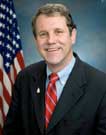|
|
 |
|
The
views expressed
on this page are soley those of the author and do not
necessarily
represent the views of County News Online
|
 |
U.S. Senator Sherrod Brown
Preventing the
Spread of Ebola in the United States
Over the last few weeks, we have heard a lot about the Ebola virus. The
stories from Africa are heartbreaking – countries with limited
resources are fighting to contain the disease and in many cases it is
spreading faster than it can be controlled. In Liberia, Ebola cases are
doubling every 15-20 days, with a million cases possible in western
Africa by the end of the year if the current trends continue.
With the first case reported in the United States, it’s only natural to
wonder how big a threat Ebola poses for our own country. The good news
is that when proper safety measures are taken, outbreaks can be
prevented or minimized. We all have a part to play by knowing the facts
and supporting the efforts of some of the world’s most eminent public
health experts and scholars.
The Ebola virus can only be spread through direct contact with the
blood or other bodily fluids of an infected individual, and cannot be
spread through water or transmitted through the air. We are fortunate
that the United States is home to some of the world’s best physicians,
most advanced medical care and research infrastructure, and finest
treatment capabilities. Thanks to public health agencies like the
Centers for Disease Control and Prevention (CDC), we are prepared to
monitor, track, and treat the spread of Ebola in the United States.
However, preventing widespread illness due to infectious diseases is
resource intensive, and the successful treatment of Ebola requires
constant, intensive care. The best way to control this dangerous
disease is to have trained CDC professionals, in coordination with
other nations, use well-established outbreak management strategies and
support the heavily affected regions in their efforts to educate people
about signs, symptoms, and prevention strategies.
In the United States, the CDC is ensuring that the Transportation
Security Administration and border protection staff are all trained to
look for signs of illness and to alert quarantine staff if a passenger
is suspected of having Ebola. The National Institutes of Health (NIH),
another essential public health agency, is conducting intensive
research on Ebola and other diseases, seeking vaccines or treatments
that will combat them.
The CDC provides a critical first response when these threats to public
health occur.
Last year, Senator Isakson (R-GA) and I delivered a bipartisan set of
speeches on the Senate floor about the important work the CDC is doing.
Support for public health goes beyond partisan differences – it’s about
saving lives.
While we have taken steps to help address this public health crisis and
to prevent the disease from spreading, we must do more.
I support the work that the Director of the CDC, Dr. Frieden, and his
dedicated public health officials are doing and applaud the leadership
he has shown. In September, Dr. Frieden and I visited the Cleveland
Clinic to discuss my legislation to strengthen the federal response to
antibiotic resistance. His visit demonstrated the CDC’s hands-on
approach to healthcare and its commitment to combating a variety of
illnesses.
To address the threat of Ebola and prevent future outbreaks, we must
support these agencies and their commitment to American’s public health.
Sincerely,
Sherrod Brown
U.S. Senator
|
|
|
|

